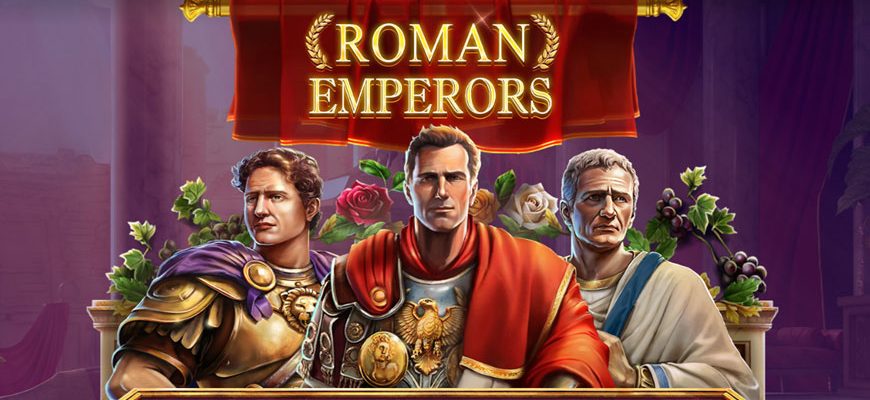As I sit here, surrounded by the echoes of ancient history, I can’t help but be drawn into the fascinating world of Roman Emperors. It’s a subject that has captivated me for years, and today, I want to share my passion with you. But before we dive into the lives of these powerful rulers, let me tell you about an intriguing modern twist on this ancient theme – the Roman Emperors slot game by Red Tiger, boasting an impressive RTP of 95.76%. It’s a perfect blend of history and entertainment, don’t you think?

The Roman Empire – a name that still evokes awe and wonder, even after millennia. It’s hard to believe that this vast empire, which once stretched from Britain to Egypt, began as a small city-state on the banks of the Tiber River. But that’s the beauty of history, isn’t it? The most extraordinary things often have the humblest beginnings.
The transition from Republic to Empire wasn’t an overnight affair. It was a gradual process, marked by political intrigue, military conquests, and social upheaval. At the center of this transformation stood one man: Julius Caesar. Now, I know what you’re thinking – wasn’t Caesar assassinated before he could become emperor? You’re absolutely right, but his impact on Roman history can’t be overstated.
Caesar’s adopted son and heir, Octavian, would go on to become the first Roman Emperor, taking the name Augustus. And thus began the age of the Roman Emperors.
Augustus, oh Augustus! What a fascinating character he was. Imagine being thrust into the spotlight at the tender age of 18, inheriting not just a name but the expectations of a nation. That’s exactly what happened to young Octavian when Julius Caesar named him as his heir.
But don’t let his youth fool you. Augustus was a master politician, deftly maneuvering through the treacherous waters of Roman politics. He understood something fundamental about power – it’s not just about having it, but about how you use it.
Augustus presented himself as the ‘first among equals’, maintaining the facade of the Republic while wielding near-absolute power. Clever, wasn’t he? He embarked on a massive building program, famously boasting that he “found Rome a city of bricks and left it a city of marble.” Talk about a home improvement project!
Under his rule, the Roman Empire entered a period of unprecedented peace and prosperity known as the Pax Romana. It’s almost like he hit the jackpot in the game of empire-building, much like you might hope to do in that Roman Emperors slot game I mentioned earlier. But remember, in both cases, it’s not just about luck – it’s about strategy.
After Augustus, power stayed in the family with the Julio-Claudian dynasty. This period gave us some of the most infamous emperors in Roman history. Ever heard of Caligula? Nero? These names have become synonymous with excess and cruelty.
Take Caligula, for instance. Legend has it that he was so mad, he tried to make his horse a consul. Now, I’m all for animal rights, but that might be taking things a bit too far, don’t you think? Of course, we should take these stories with a grain of salt. Ancient historians had a tendency to exaggerate, especially when it came to unpopular emperors.
Then there’s Nero, often remembered as the emperor who “fiddled while Rome burned.” In reality, the fiddle hadn’t been invented yet, and Nero was more likely playing the lyre. But why let facts get in the way of a good story, right? Nero’s reign ended in 68 AD, marking the end of the Julio-Claudian dynasty and ushering in a period of civil war known as the Year of the Four Emperors.
After the tumultuous Year of the Four Emperors, Rome entered what many historians consider its golden age under the rule of the Five Good Emperors: Nerva, Trajan, Hadrian, Antoninus Pius, and Marcus Aurelius.
These emperors were known for their wisdom, justice, and good governance. Under their rule, the empire reached its greatest territorial extent and enjoyed a period of peace and prosperity. It’s like they hit a royal flush in the poker game of imperial rule!
Trajan, for example, was a military man who expanded the empire to its largest size. Hadrian, on the other hand, focused on consolidation rather than expansion. He’s the guy who built that famous wall in Britain. You know, the one that kept the Scots out? Well, it didn’t work perfectly, but A for effort, right?
Then there’s Marcus Aurelius, the philosopher-emperor. This guy would write deep thoughts about life and duty in his tent while on military campaigns. Talk about multitasking! His “Meditations” are still read today, offering wisdom that transcends time. It’s almost like he left us a self-help book from the 2nd century.
After the golden age of the Five Good Emperors, we enter a period of military domination with the Severan dynasty. These emperors came to power through force and maintained their rule through the support of the army. It’s a bit like a game of king of the hill, but with swords and legions instead of playground pushes.
Septimius Severus, the founder of this dynasty, was a military man through and through. He famously advised his sons to enrich the soldiers and scorn all others. Not exactly a motto that wins hearts and minds, is it? But in the rough and tumble world of Roman politics, it was often better to be feared than loved.
The Severan dynasty gave us one of the most intriguing figures in Roman history: Elagabalus. This young emperor scandalized Rome with his religious practices and alleged sexual escapades. He’s said to have married a Vestal Virgin (a big no-no in Roman religion) and may have identified as a woman at times. In the conservative world of ancient Rome, Elagabalus was like a punk rocker at a classical music concert – shocking, controversial, and ultimately short-lived.
After the Severan dynasty, the Roman Empire entered a period of severe crisis. This wasn’t just a bad hair day for the empire – it was more like a full-blown identity crisis combined with a midlife crisis and a financial crisis all rolled into one.
For about 50 years, the empire was plagued by civil wars, invasions, plague, and economic depression. Emperors rose and fell with dizzying speed. In fact, at one point, there were so many men claiming to be emperor that this period is sometimes called the “Age of Thirty Tyrants.” Talk about too many cooks spoiling the broth!
But here’s the thing about crises – they often lead to innovation and change. And that’s exactly what happened with the Roman Empire. Out of this chaos emerged a new system of government, the Dominate, which would characterize the later Roman Empire.
Enter Diocletian, the emperor who decided that ruling the Roman Empire was too big a job for one person. His solution? The Tetrarchy – a system of rule by four emperors. It’s like he looked at the empire and thought, You know what this needs? More bureaucracy!
Jokes aside, Diocletian’s reforms were actually quite innovative. He divided the empire into Eastern and Western halves, each ruled by an Augustus (senior emperor) and a Caesar (junior emperor). The idea was that when an Augustus retired or died, the Caesar would step up, and a new Caesar would be appointed. It was meant to provide stability and smooth transitions of power.
In theory, it was brilliant. In practice? Well, let’s just say that getting four powerful men to play nice and share wasn’t as easy as Diocletian had hoped. The system collapsed not long after Diocletian’s retirement, leading to more civil wars. But hey, you can’t fault a guy for trying, right?
Out of the chaos that followed the collapse of the Tetrarchy emerged one of the most famous Roman Emperors of all time: Constantine the Great. Now, Constantine is best known for two things: founding Constantinople (modern-day Istanbul) and converting to Christianity.
Constantine’s conversion is the stuff of legend. According to the story, he saw a vision of a cross in the sky before a crucial battle, along with the words In this sign, conquer. Whether you believe in divine visions or not, there’s no denying that Constantine’s embrace of Christianity changed the course of Western history.
Under Constantine, Christianity went from being a persecuted minority religion to the favored faith of the emperor. It’s like Christianity hit the religious lottery! This shift would have profound implications for the future of the Roman Empire and, indeed, for the whole of European history. Now, we come to what many consider the end of the Roman Empire – the fall of Rome in 476 AD. But here’s a little secret: the fall of Rome wasn’t as dramatic as it sounds. There was no big battle, no heroic last stand. In fact, many Romans probably didn’t even realize that their empire had “fallen.
What happened was that a Germanic chieftain named Odoacer deposed the last Western Roman Emperor, a young boy named Romulus Augustulus. Odoacer then declared himself King of Italy, and that was that. The Western Roman Empire was no more.
But wait, you might be thinking, what about the Eastern Roman Empire? Well, that’s the thing – it continued on for another thousand years! The Eastern Roman Empire, which we now call the Byzantine Empire, carried on the legacy of Rome well into the Middle Ages.
So, was 476 really the “fall” of Rome? Or just a changing of the guard? It’s a question that historians still debate today. Personally, I like to think of it as Rome’s retirement. After all, ruling an empire for a thousand years is hard work. Maybe Rome just decided it was time to kick back, relax, and let someone else do the heavy lifting for a while.
As we come to the end of our journey through the age of Roman Emperors, it’s worth taking a moment to reflect on their legacy. The Roman Emperors shaped not just their own time, but the course of Western civilization. Their laws, their architecture, their very concept of empire – all of these continue to influence our world today.
Think about it – we still use words like “emperor” and “caesar.” Our modern legal systems owe a huge debt to Roman law. And let’s not forget about those Roman numerals that pop up at the end of movie credits or in the names of Super Bowls.
But perhaps the most enduring legacy of the Roman Emperors is the idea of Rome itself. Rome has become more than just a city or an empire – it’s become a symbol of power, civilization, and enduring greatness. As the saying goes, “All roads lead to Rome.”
And that brings us full circle to where we started – with that Roman Emperors slot game. It’s just one small example of how the fascination with Roman Emperors continues to this day. Whether it’s through history books, Hollywood movies, or yes, even slot games, the allure of the Roman Emperors remains as strong as ever.

In the end, the story of the Roman Emperors is our story – a tale of ambition, power, triumph, and tragedy. It’s a reminder of the heights to which humanity can soar, and the depths to which we can sink. But most of all, it’s a testament to the enduring human spirit – our capacity to build, to dream, and to leave a lasting mark on the world.
So here’s to the Roman Emperors – may their legacy continue to inspire, intrigue, and occasionally help us win a jackpot or two. Ave Imperator!

